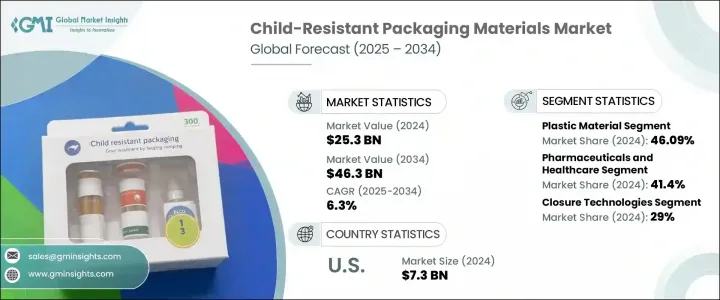
|
시장보고서
상품코드
1797765
어린이 보호 포장 재료 시장 : 기회, 성장 촉진요인, 산업 동향 분석, 예측(2025-2034년)Child-Resistant Packaging Materials Market Opportunity, Growth Drivers, Industry Trend Analysis, and Forecast 2025 - 2034 |
||||||
세계의 어린이 보호 포장 재료 시장은 2024년 253억 달러에 달하고, CAGR 6.3%로 성장하여 2034년까지 463억 달러에 이를 것으로 추정됩니다.
이 틈새 분야는 유아, 특히 5세 미만의 어린이가 위험한 제품에 접근하는 것을 방지하는 한편, 노인을 포함한 성인의 안전한 접근을 가능하게 하는 포장 시스템의 중요한 설계를 다루고 있습니다. CRP 제품에는 일반적으로 푸시 턴식 캡, 블리스터 팩, 락 첨부 지퍼, 다층 파우치 등이 있으며, 모두 미국 소비자 제품 안전위원회가 시행하는 '독극물 혼입 방지 포장법' 등의 법률에서 정한 엄격한 요건을 충족하도록 설계되어 있습니다. 처방약이나 시판약, 가정용 화학약품, 대마 유래 제품 등에 널리 사용되고 있는 CRP 소재는 성인에게 있어서의 편리함을 해치지 않고, 우발적인 중독 사고를 최소한으로 억제하기 위한 중심적인 역할을 담당하고 있습니다.

의약품, 보충제, 대마 관련 제품의 전자상거래와 택배의 상승은 변조 방지 및 운송 중 안전성을 고려한 어린이 저항에 대한 수요를 높이고 있습니다. 동시에, 지속가능성에 대한 우려로 포장 제공업체는 재활용 가능한 소재와 생분해가능한 어린이 보호 소재를 요구하게 되어 혁신을 촉진하고 디자인의 가능성을 넓히고 있습니다. 환경 규제가 강화되고 친환경 솔루션에 대한 소비자의 요구가 높아짐에 따라 제조업체는 안전 및 지속가능성 기준을 모두 충족하는 바이오 플라스틱, 종이 기반 라미네이트, 퇴비화 가능한 필름 등 대체 기판을 적극적으로 찾고 있습니다. 이 시프트는 탄소 발자국을 줄이면서 같은 수준의 내아성을 제공하는 하이브리드 재료 구조의 개발을 추진하고 있습니다.
| 시장 범위 | |
|---|---|
| 시작 연도 | 2024년 |
| 예측 기간 | 2025-2034년 |
| 당초 시장 규모 | 253억 달러 |
| 시장 규모 예측 | 463억 달러 |
| CAGR | 6.3% |
플라스틱 기반 재료 부문은 2024년에 점유율 46.09%를 차지했으며, 2034년까지 연평균 복합 성장률(CAGR) 4.5%를 보일 것으로 예측됩니다. 폴리에틸렌(PE), 폴리프로필렌(PP), PET 등의 열가소성 플라스틱은 의료, 영양 보조 식품, 소비자용도의 기능 안전 기준을 충족하는 푸시 턴식 캡, 클로저, 블리스터 트레이, 리실러블 파우치와 같은 견고하고 경량 형식으로 성형할 수 있기 때문에 우위를 차지하고 있습니다.
용도별로는 의약품 및 의료분야가 2024년에 점유율 41.4%를 차지했고 2034년까지 연평균 복합 성장률(CAGR) 5.4%를 보일 것으로 예측되고 있습니다. 이 지배적인 배경은 미국 FDA와 유럽 EMA와 같은 엄격한 규제 시스템을 가지고 있으며, 처방약, 상업용 의약품 및 영양 보충제에 대한 CRP 준수를 의무화하고 소아에 대한 위험을 최소화합니다.
북미의 어린이 보호 포장 재료의 2024년 시장 규모는 73억 달러였습니다. 미국 시장의 성장을 뒷받침하는 것은 합법적인 대마초 부문 전체의 규제 요건이며, 에디블, 틴크제, 오일, 농축물을 포함한 모든 대마초 유래 품목에 인증 CRP가 의무화되고 있습니다. 맞춤형 CRP 솔루션은 주요 주 성인용 대마초 포장 관련 법률을 준수합니다. 온라인 약국이나 소비자 직매의 대마 판매의 대두도, 변조 방지용 어린이 저항 파우치 개발의 기회를 낳고 있습니다.
세계 어린이 보호 포장 재료 시장을 형성하는 최고 기업은 Gerresheimer AG, WestRock Company, Amcor plc, Berry Global Inc., AptarGroup, Inc. 등이 있습니다. 선도 기업은 R&D에 투자하고 생분해성 폴리머와 재활용 가능한 형식 등 안전과 환경 지속가능성의 균형을 이루는 혁신적인 CRP 재료를 설계하고 있습니다. 또한 ASTM, CPSC, EU 지침 등 국제 규제 기준에 대한 인증 및 규정 준수를 추구하고 국제 시장에서 제품 수용을 지원합니다. 제약 제조업체, 대마초 브랜드 및 전자상거래 플랫폼과의 제휴를 통해 특정 최종 이용 사례에 맞는 CRP 솔루션을 사용할 수 있습니다. 각 회사는 특히 대마초 및 의료 관련 규제가 진화하는 시장에서 제조 능력을 확대하고 지역 유통망을 확대하고 있습니다.
목차
제1장 조사 방법
- 시장의 범위와 정의
- 분석 디자인
- 분석 접근
- 데이터 수집 방법
- 데이터 마이닝 소스
- 세계
- 지역/국가
- 기본 추정과 계산
- 기준연도 계산
- 시장 예측의 주요 동향
- 1차 조사와 검증
- 1차 정보
- 예측 모델
- 분석의 전제와 한계
제2장 주요 요약
제3장 업계 인사이트
- 생태계 분석
- 공급자의 상황
- 이익률 분석
- 비용 구조
- 각 단계에서의 부가가치
- 밸류체인에 영향을 주는 요인
- 혁신
- 업계에 미치는 영향요인
- 성장 촉진요인
- 연비 효율이 높은 선박 운항 수요 증가
- IMO 규제에 의한 컴플라이언스 요구의 급증
- 원격 진단 및 IoT 기반 솔루션 도입 증가
- 해상무역 증가와 선박함대 확대
- 업계의 잠재적 위험과 과제
- MEMS 시스템의 높은 초기 투자 비용
- 시스템 도입을 위한 숙련된 해사 기술자의 부족
- 시장 기회
- 하이브리드 및 전기 추진 시스템에서 MEMS 확장
- 자율형 및 원격조작형 선박 프로젝트의 급증
- 스마트 포트와 연결된 항로에 대한 투자 증가
- 조선소에서의 디지털 트윈 기술의 도입
- 성장 촉진요인
- 성장 가능성 분석
- 규제 상황
- 북미
- 유럽
- 아시아태평양
- 라틴아메리카
- 중동 및 아프리카
- Porter's Five Forces 분석
- PESTLE 분석
- 기술과 혁신의 상황
- 현재의 기술 동향
- 신흥기술
- 가격 동향
- 지역별
- 제품별
- 코스트 내역 분석
- 특허 분석
- 지속가능성과 환경 측면
- 지속가능한 관행
- 폐기물 감축 전략
- 생산에서의 에너지 효율
- 환경 친화적인 노력
- 탄소발자국의 고려
제4장 경쟁 구도
- 소개
- 기업의 시장 점유율 분석
- 북미
- 유럽
- 아시아태평양
- 라틴아메리카
- 중동 및 아프리카
- 주요 시장 기업의 경쟁 분석
- 경쟁 포지셔닝 매트릭스
- 전략적 전망 매트릭스
- 주요 발전
- 기업 합병 및 인수(M&A)
- 사업 제휴 및 협력
- 신제품 발매
- 확장계획과 자금조달
제5장 시장 추계 및 예측 : 재료유형별(2021-2034년)
- 주요 동향
- 플라스틱 재료
- 폴리프로필렌(PP) 시스템
- 표준 PP 배합
- 내구성 강화 등급
- 색상과 첨가물의 변형
- 폴리에틸렌(PE) 솔루션
- HDPE 클로저 용도
- LDPE 연포장
- 특수 PE 제제
- 엔지니어링 플라스틱
- 폴리카보네이트(PC)의 용도
- 아크릴로니트릴부타디엔스티렌(ABS)
- 특수 엔지니어링 등급
- 폴리프로필렌(PP) 시스템
- 금속재료
- 알루미늄 클로저 시스템
- 표준 알루미늄 캡
- 복합 알루미늄 솔루션
- 특수 알루미늄 합금
- 강철·제철의 용도
- 전통적인 스틸 클로저
- 주석 특수 시스템
- 내부식성 배합
- 알루미늄 클로저 시스템
- 복합재료 및 하이브리드재료
- 플라스틱 및 금속 조합
- 다층 장벽 시스템
- 특수 복합 배합
- 지속 가능한 바이오 소재
- 재활용 가능한 재료 시스템
- 바이오 베이스 폴리머 용도
제6장 시장 추계 및 예측 : 용도별(2021-2034년)
- 의약품 및 의료
- 처방약
- 규제물질
- 시판약
- 전문의약품
- 비타민 및 보충제
- 성인용 비타민 및 미네랄
- 어린이용 보충제
- 특수 영양 제품
- 의료기기 및 의료용품
- 진단 제품
- 치료기기
- 의료용 소모품
- 처방약
- 대마 및 헴프 제품
- 엔터테인먼트용 대마초
- 꽃 및 프리롤
- 식품음료
- 농축물 및 엑기스
- 의료용 대마초
- 처방 대마제품
- 치료용 제제
- 환자 전용 패키지
- 헴프 유래 제품
- CBD 제품
- 대마 기반 보충 교재
- 국소 적용
- 엔터테인먼트용 대마초
- 가정용 화학제품 및 세제
- 청소용품
- 세탁용 세제
- 가정용 세제
- 특수 세정액
- 퍼스널 케어용 화학제품
- 헤어 케어 제품
- 네일 케어 용액
- 전문 퍼스널케어
- 자동차 및 공업용 화학제품
- 소비자용 자동차 제품
- DIY 산업 솔루션
- 특수 화학제품 응용
- 청소용품
- 식품 및 음료 용도
- 알코올 음료
- 특산 식품
- 영양보조식품
- 기타 용도
- 전자제품
- 장난감 및 게임
- 특수 소비재
제7장 시장 추계 및 예측 : 기술 유형별(2021-2034년)
- 주요 동향
- 폐쇄 기술
- 푸시 턴식 클로저
- 표준적인 푸시 턴 기구
- 고급 다단계 시스템
- 노인 친화적 디자인
- 스퀴즈 턴식 클로저
- 기존 스퀴즈 턴 시스템
- 강화형 그립 기술
- 인체공학에 근거한 디자인 혁신
- 래치 록 기구
- 기계식 래치 시스템
- 전자 잠금 기술
- 콤비네이션 잠금 시스템
- 푸시 턴식 클로저
- 블리스터 팩 기술
- 누름 내성 시스템
- 필름 배리어 기술
- 백킹 재료 혁신
- 다층 보호 시스템
- 벗겨지기 어려운 기술
- 접착 시스템 혁신
- 기판 재료의 개발
- 아이가 열기 어려운 박리 기구
- 누름 내성 시스템
- 연포장 솔루션
- 어린이 보호 파우치
- 지퍼 클로저 시스템
- 찢어지기 어려운 재료
- 재밀봉 가능한 안전 기능
- 특수 플렉서블 시스템
- 안전 기능 이있는 스탠드 업 파우치
- 롤 스톡 용도
- 유연한 커스텀 솔루션
- 어린이 보호 파우치
- 스마트 및 커넥티드 테크놀로지
- 전자 어린이 보호 시스템
- IoT 대응 안전 기능
- 생체 인증 액세스 제어
제8장 시장 추계 및 예측 : 지역별(2021-2034년)
- 주요 동향
- 북미
- 미국
- 캐나다
- 유럽
- 독일
- 영국
- 프랑스
- 스페인
- 이탈리아
- 기타 유럽
- 아시아태평양
- 중국
- 인도
- 일본
- 호주
- 한국
- 기타 아시아태평양
- 라틴아메리카
- 브라질
- 멕시코
- 아르헨티나
- 기타 라틴아메리카
- 중동 및 아프리카
- 사우디아라비아
- 남아프리카
- 아랍에미리트(UAE)
- 기타 중동 및 아프리카
제9장 기업 프로파일
- Berry Global Inc.
- AptarGroup, Inc.
- Amcor plc
- Gerresheimer AG
- Mondi Group
- Klockner Pentaplast
- SGD Pharma
- Bilcare Limited
- WestRock Company
- Pretium Packaging
- Origin Pharma Packaging
- Comar, LLC
- Global Closures Systems
- Reynolds Group Holdings
- Stora Enso Oyj
The Global Child-Resistant Packaging Materials Market was valued at USD 25.3 billion in 2024 and is estimated to grow at a CAGR of 6.3% to reach USD 46.3 billion by 2034. This niche sector addresses the critical design of packaging systems that prevent young children-especially those under five-from accessing hazardous products, while still allowing safe adult access, including seniors. CRP products commonly include push-and-turn caps, blister packs, locking zippers, and multi-layer pouches, all engineered to meet stringent requirements outlined in legislation such as the Poison Prevention Packaging Act enforced by the U.S. Consumer Product Safety Commission. With widespread use in prescription and over-the-counter medications, household chemicals, and cannabis-derived products, CRP materials are central to minimizing accidental poisonings without compromising usability for adults.

The rise of e-commerce and at home delivery for pharmaceuticals, supplements, and cannabis-related goods has boosted the demand for child-resistant features that are also tamper-evident and secure during transit. At the same time, sustainability concerns are pushing packaging providers toward recyclable or biodegradable child-resistant materials, encouraging innovation and expanding design possibilities. As environmental regulations tighten and consumer demand for eco-friendly solutions grows, manufacturers are actively exploring alternative substrates like bio-based plastics, paper-based laminates, and compostable films that meet both safety and sustainability criteria. This shift is driving the development of hybrid material structures that offer the same level of child resistance while reducing the carbon footprint.
| Market Scope | |
|---|---|
| Start Year | 2024 |
| Forecast Year | 2025-2034 |
| Start Value | $25.3 Billion |
| Forecast Value | $46.3 Billion |
| CAGR | 6.3% |
The plastic-based materials segment held 46.09% share in 2024 and is expected to grow at a 4.5% CAGR through 2034. Thermoplastics such as polyethylene (PE), polypropylene (PP), and PET dominate due to their ability to be molded into robust, lightweight formats-like push-and-turn caps, closures, blister trays, and resealable pouches-that meet functional safety standards in medical, nutraceutical, and consumer applications.
In terms of applications, the pharmaceutical and healthcare segment held a 41.4% share in 2024 and is expected to grow at a CAGR of 5.4% through 2034. This dominance is driven by strict regulatory regimes-such as those enforced by the U.S. FDA and European EMA-that mandate CRP compliance for prescription medications, over-the-counter drugs, and dietary supplements to minimize risk to children.
North America Child-Resistant Packaging Materials Market generated USD-7.3-billion in 2024. Growth in the U.S. market is propelled by regulatory requirements across the legal cannabis sector, mandating certified CRP for all cannabis-derived items, including edibles, tinctures, oils, and concentrates. Customizable CRP solutions meet adult-use cannabis packaging laws across major states. The rise of online pharmacies and direct-to-consumer cannabis sales has also created opportunities for tamper-evident child-resistant pouch development.
Top companies shaping this Global Child-Resistant Packaging Materials Market include Gerresheimer AG, WestRock Company, Amcor plc, Berry Global Inc., and AptarGroup, Inc. Leading firms are investing in R&D to design innovative CRP materials that balance safety with environmental sustainability, including biodegradable polymers and recyclable formats. They pursue certification and compliance with global regulatory standards-such as ASTM, CPSC, and EU directives-to support product acceptance across international markets. Partnerships with pharmaceutical manufacturers, cannabis brands, and e-commerce platforms enable tailored CRP solutions for specific end-use cases. Companies are also scaling manufacturing capabilities and expanding regional distribution networks, particularly in markets with evolving cannabis and healthcare regulations.
Table of Contents
Chapter 1 Methodology
- 1.1 Market scope and definition
- 1.2 Research design
- 1.2.1 Research approach
- 1.2.2 Data collection methods
- 1.3 Data mining sources
- 1.3.1 Global
- 1.3.2 Regional/Country
- 1.4 Base estimates and calculations
- 1.4.1 Base year calculation
- 1.4.2 Key trends for market estimation
- 1.5 Primary research and validation
- 1.5.1 Primary sources
- 1.6 Forecast model
- 1.7 Research assumptions and limitations
Chapter 2 Executive Summary
- 2.1 Industry 360° synopsis, 2021 - 2034
- 2.2 Key market trends
- 2.2.1 Regional
- 2.2.2 Material Type
- 2.2.3 Technology
- 2.2.4 Application
- 2.2.5 End Use
- 2.3 TAM Analysis, 2025-2034
- 2.4 CXO perspectives: Strategic imperatives
- 2.4.1 Executive decision points
- 2.4.2 Critical success factors
- 2.5 Future outlook and strategic recommendations
Chapter 3 Industry Insights
- 3.1 Industry ecosystem analysis
- 3.1.1 Supplier landscape
- 3.1.2 Profit margin analysis
- 3.1.3 Cost structure
- 3.1.4 Value addition at each stage
- 3.1.5 Factor affecting the value chain
- 3.1.6 Disruptions
- 3.2 Industry impact forces
- 3.2.1 Growth drivers
- 3.2.1.1 Increase in demand for fuel-efficient vessel operations
- 3.2.1.2 Surge in compliance needs due to IMO regulations
- 3.2.1.3 Rise in deployment of remote diagnostics and IoT-based solutions
- 3.2.1.4 Rising maritime trade & vessel fleet expansion
- 3.2.2 Industry pitfalls and challenges
- 3.2.2.1 High initial investment cost for MEMS systems
- 3.2.2.2 Shortage of skilled maritime technicians for system deployment
- 3.2.3 Market opportunities
- 3.2.3.1 Expansion of MEMS in hybrid and electric propulsion systems
- 3.2.3.2 Surge in autonomous and remotely operated vessel projects
- 3.2.3.3 Rising investments in smart ports and connected shipping lanes
- 3.2.3.4 Adoption of digital twin technologies in shipyards
- 3.2.1 Growth drivers
- 3.3 Growth potential analysis
- 3.4 Regulatory landscape
- 3.4.1 North America
- 3.4.2 Europe
- 3.4.3 Asia Pacific
- 3.4.4 Latin America
- 3.4.5 Middle East & Africa
- 3.5 Porter's analysis
- 3.6 PESTEL analysis
- 3.7 Technology and Innovation landscape
- 3.7.1 Current technological trends
- 3.7.2 Emerging technologies
- 3.8 Price trends
- 3.8.1 By region
- 3.8.2 By product
- 3.9 Cost breakdown analysis
- 3.10 Patent analysis
- 3.11 Sustainability and environmental aspects
- 3.11.1 Sustainable practices
- 3.11.2 Waste reduction strategies
- 3.11.3 Energy efficiency in production
- 3.11.4 Eco-friendly Initiatives
- 3.12 Carbon footprint considerations
Chapter 4 Competitive Landscape, 2024
- 4.1 Introduction
- 4.2 Company market share analysis
- 4.2.1 North America
- 4.2.2 Europe
- 4.2.3 Asia Pacific
- 4.2.4 LATAM
- 4.2.5 MEA
- 4.3 Competitive analysis of major market players
- 4.4 Competitive positioning matrix
- 4.5 Strategic outlook matrix
- 4.6 Key developments
- 4.6.1 Mergers & acquisitions
- 4.6.2 Partnerships & collaborations
- 4.6.3 New Product Launches
- 4.6.4 Expansion Plans and funding
Chapter 5 Market Estimates & Forecast, By Material Type, 2021-2034 (USD Million & Kilo Tons)
- 5.1 Key trends
- 5.2 Plastic materials
- 5.2.1 Polypropylene (PP) systems
- 5.2.1.1 Standard pp formulations
- 5.2.1.2 Enhanced durability grades
- 5.2.1.3 Colour and additive variations
- 5.2.2 Polyethylene (PE) solutions
- 5.2.2.1 HDPE closure applications
- 5.2.2.2 LDPE flexible packaging
- 5.2.2.3 Specialty pe formulations
- 5.2.3 Engineering plastics
- 5.2.3.1 Polycarbonate (PC) applications
- 5.2.3.2 Acrylonitrile butadiene styrene (ABS)
- 5.2.3.3 Specialty engineering grades
- 5.2.1 Polypropylene (PP) systems
- 5.3 Metal materials
- 5.3.1 Aluminum closure systems
- 5.3.1.1 Standard aluminum caps
- 5.3.1.2 Composite aluminum solutions
- 5.3.1.3 Specialty aluminum alloys
- 5.3.2 Steel and tinplate applications
- 5.3.2.1 Traditional steel closures
- 5.3.2.2 Tinplate specialty systems
- 5.3.2.3 Corrosion-resistant formulations
- 5.3.1 Aluminum closure systems
- 5.4 Composite and hybrid materials
- 5.4.1 Plastic-metal combinations
- 5.4.2 Multi-layer barrier systems
- 5.4.3 Specialty composite formulations
- 5.5 Sustainable and bio-based materials
- 5.5.1 Recyclable material systems
- 5.5.2 Bio-based polymer applications
Chapter 6 Market Estimates & Forecast, By Application, 2021-2034 (USD Million & Kilo Tons)
- 6.1 Pharmaceuticals and healthcare
- 6.1.1 Prescription medications
- 6.1.1.1 Controlled substances
- 6.1.1.2 Over-the-counter medications
- 6.1.1.3 Specialty pharmaceuticals
- 6.1.2 Vitamins and supplements
- 6.1.2.1 Adult vitamins and minerals
- 6.1.2.2 Children's supplements
- 6.1.2.3 Specialty nutritional products
- 6.1.3 Medical devices and supplies
- 6.1.3.1 Diagnostic products
- 6.1.3.2 Therapeutic devices
- 6.1.3.3 Medical consumables
- 6.1.1 Prescription medications
- 6.2 Cannabis and hemp products
- 6.2.1 Recreational cannabis
- 6.2.1.1 Flower and pre-rolls
- 6.2.1.2 Edibles and beverages
- 6.2.1.3 Concentrates and extracts
- 6.2.2 Medical cannabis
- 6.2.2.1 Prescription cannabis products
- 6.2.2.2 Therapeutic formulations
- 6.2.2.3 Patient-specific packaging
- 6.2.3 Hemp-derived products
- 6.2.3.1 CBD products
- 6.2.3.2 Hemp-based supplements
- 6.2.3.3 Topical applications
- 6.2.1 Recreational cannabis
- 6.3 Household chemicals and cleaners
- 6.3.1 Cleaning products
- 6.3.1.1 Laundry detergents
- 6.3.1.2 Household cleaners
- 6.3.1.3 Specialty cleaning solutions
- 6.3.2 Personal care chemicals
- 6.3.2.1 Hair care products
- 6.3.2.2 Nail care solutions
- 6.3.2.3 Specialty personal care
- 6.3.3 Automotive and industrial chemicals
- 6.3.3.1 Consumer automotive products
- 6.3.3.2 DIY industrial solutions
- 6.3.3.3 Specialty chemical applications
- 6.3.1 Cleaning products
- 6.4 Food and beverage applications
- 6.4.1 Alcoholic beverages
- 6.4.2 Specialty food products
- 6.4.3 Dietary supplements
- 6.5 Other applications
- 6.5.1 Electronic products
- 6.5.2 Toys and games
- 6.5.3 Specialty consumer products
Chapter 7 Market Estimates & Forecast, By Technology Type,2021-2034 (USD Million & Kilo Tons)
- 7.1 Key Trends
- 7.2 Closure technologies
- 7.2.1 Push-and-turn closures
- 7.2.1.1 Standard push-and-turn mechanisms
- 7.2.1.2 Advanced multi-step systems
- 7.2.1.3 Senior-friendly designs
- 7.2.2 Squeeze-and-turn closures
- 7.2.2.1 Traditional squeeze-and-turn systems
- 7.2.2.2 Enhanced grip technologies
- 7.2.2.3 Ergonomic design innovations
- 7.2.3 Latch and lock mechanisms
- 7.2.3.1 Mechanical latch systems
- 7.2.3.2 Electronic lock technologies
- 7.2.3.3 Combination lock systems
- 7.2.1 Push-and-turn closures
- 7.3 Blister pack technologies
- 7.3.1 Push-through resistant systems
- 7.3.1.1 Film barrier technologies
- 7.3.1.2 Backing material innovations
- 7.3.1.3 Multi-layer protection systems
- 7.3.2 Peel-back resistant technologies
- 7.3.2.1 Adhesive system innovations
- 7.3.2.2 Substrate material developments
- 7.3.2.3 Child-resistant peel mechanisms
- 7.3.1 Push-through resistant systems
- 7.4 Flexible packaging solutions
- 7.4.1 Child-resistant pouches
- 7.4.1.1 Zipper and closure systems
- 7.4.1.2 Tear-resistant materials
- 7.4.1.3 Reclosable safety features
- 7.4.2 Specialty flexible systems
- 7.4.2.1 Stand-up pouches with safety features
- 7.4.2.2 Roll-stock applications
- 7.4.2.3 Custom flexible solutions
- 7.4.1 Child-resistant pouches
- 7.5 Smart and connected technologies
- 7.5.1 Electronic child-resistant systems
- 7.5.2 IoT-enabled safety features
- 7.5.3 Biometric access controls
Chapter 8 Market Estimates & Forecast, By Region,2021-2034 (USD Million & Kilo Tons)
- 8.1 Key Trends
- 8.2 North America
- 8.2.1 U.S.
- 8.2.2 Canada
- 8.3 Europe
- 8.3.1 Germany
- 8.3.2 UK
- 8.3.3 France
- 8.3.4 Spain
- 8.3.5 Italy
- 8.3.6 Rest of Europe
- 8.4 Asia Pacific
- 8.4.1 China
- 8.4.2 India
- 8.4.3 Japan
- 8.4.4 Australia
- 8.4.5 South Korea
- 8.4.6 Rest of Asia Pacific
- 8.5 Latin America
- 8.5.1 Brazil
- 8.5.2 Mexico
- 8.5.3 Argentina
- 8.5.4 Rest of Latin America
- 8.6 Middle East and Africa
- 8.6.1 Saudi Arabia
- 8.6.2 South Africa
- 8.6.3 UAE
- 8.6.4 Rest of Middle East & Africa
Chapter 9 Company Profiles
- 9.1 Berry Global Inc.
- 9.2 AptarGroup, Inc.
- 9.3 Amcor plc
- 9.4 Gerresheimer AG
- 9.5 Mondi Group
- 9.6 Klockner Pentaplast
- 9.7 SGD Pharma
- 9.8 Bilcare Limited
- 9.9 WestRock Company
- 9.10 Pretium Packaging
- 9.11 Origin Pharma Packaging
- 9.12 Comar, LLC
- 9.13 Global Closures Systems
- 9.14 Reynolds Group Holdings
- 9.15 Stora Enso Oyj



















